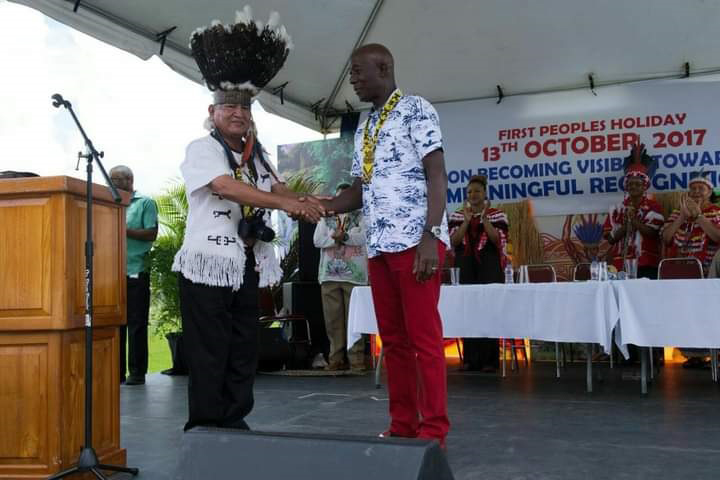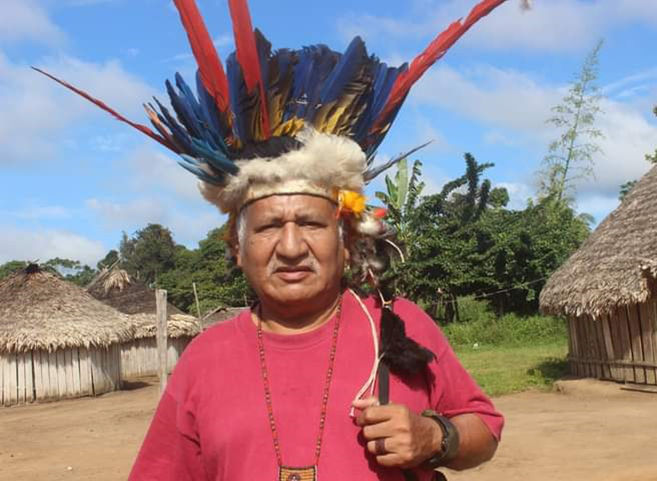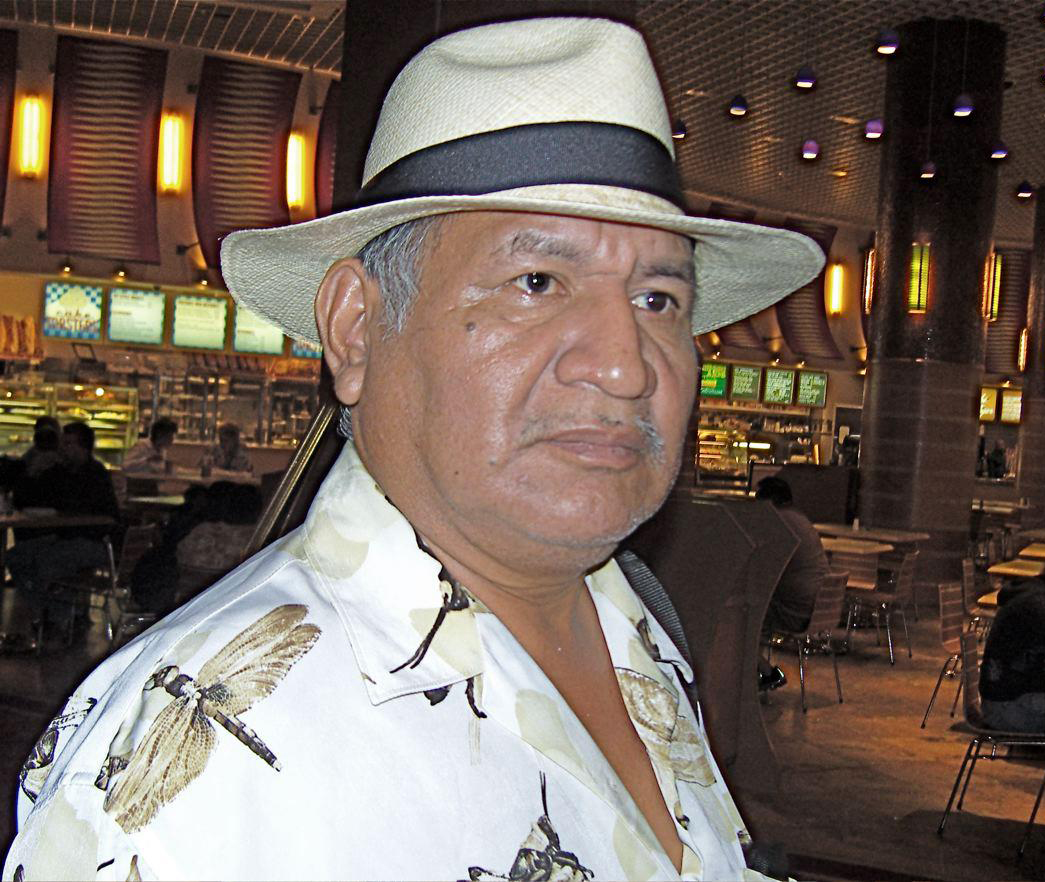When Ovid Williams gained a place at Queen’s College, English was his second language and the communication barrier and home isolation saw him turning to the guitar, which resulted in him becoming one of Guyana’s well-known and accomplished musicians. He persevered with his studies and later became the first indigenous pilot, but today his main focus and biggest concern is keeping the languages and culture alive.
His passion is to revitalize the indigenous languages and promote those that are becoming extinct. So, during the year of Indigenous Peoples languages, which was observed in 2019, Williams was contracted by the then Ministry of Indigenous Peoples’ Affairs and activated six learning groups to assist the younger generation with the languages. But he said the groups need ongoing funding to become sustainable.
“…Because language is such an important thing in everyone’s life, including the indigenous life, all our traditional knowledge, all our customs, our architecture, our music, our culinary art and our whole way of life is captured within the language. And so when we lose our language we lose the whole culture. So it is important that we capture it and maintain it,” he told Stabroek Weekend.

He decried the fact that their languages have been “downplayed in Guyana” and they have been made to believe that their languages are inferior “and when we talk our language people giggle and snicker but when Spanish, French, Chinese is being spoken it is accepted”. He believes there is need for a revolution to bring “everybody to a level of acceptance of each other, of our culture. … I wouldn’t respect you because I don’t

know you and that is how this disparity in acceptance comes about”.
Williams speaks Spanish, some Portuguese along with his Patamona language and some other Amerindian languages. His is a well-known face during indigenous month celebrations. Williams has also travelled extensively over the years; of the 216 Amerindian villages in the country, he has visited 198.
“I know every part of Guyana where indigenous people are. I can get you there. I know the culture. I know some of the languages… I have all the information,” he said confidently.
His travels have exposed him to the difficulties of the indigenous people especially when it comes to their language and out of concern he has established Kapong Maimu Inc, which provides translation services.
“Our indigenous people do not speak English, especially the older ones. When some of us get into problems and we are arrested and charged and brought to Georgetown for court we are not properly represented because of the language barriers and we are sent to jail. Similarly, when we are sick no proper diagnosis is made because the doctor cannot understand the language…,” Williams said.
Kapong Maimu Inc has 18 translators, two for each language group. They are not based in Georgetown, but if needed they will be brought to the city. He has since given his card to the various ministries and has already been contacted by PAHO and UNICEF. The service was also used by the Chambers of the Director of Public Prosecutions.
He said it is not lucrative but it gives him a feeling of accomplishment to be able to give back to his people. Because it is a skill and the translators also need some form of compensation, they do charge an affordable fee, and pro bono service is given to individuals.
‘Two strangers’
Williams was the last child of the union of the Chief of the Patamona tribe, Francis Williams and his wife, Agnes, who was eventually called Amai in the village which means in ‘mother’ in Patamona, was the only person in the community in those days who could have conversed in English. He chronicles that his mother was gifted to his father at a very young age, maybe around 15. She was an orphan and it was during his tour of duties to visit the various settlements of the Patamonas that the unmarried chief received his wife.
“It wasn’t a love affair or courting. Because she was an orphan, the elders in that area felt that he being a young man, a chief without a wife, decided that this maiden would be the right choice for him,” he said of his parents’ union. It took them about a week’s trek to return to Paramakatoi “but these were two strangers, yes she was given to him”, he continued reflectively.
A group of missionaries visited the village to spread the word of God, but the residents did not know English. His mother, who spoke English, became the translator. His parents could have been referred to as the power couple. “So my dad being chief and she being his wife and the translator, already they were a prestigious couple…,” he recalled fondly.
As a child, he travelled with his parents whenever they went to the various villages where the word of God was being preached. He attained the age of seven without ever attending school and he could not speak English. It was at that point that the missionaries advised his parents to have him to attend the American missionary school. And even though he was seven, he had to start from Prep A.
“I was a big boy compared to the others, so I felt a little funny about it… but very quickly they promoted me to Prep B and then I caught up with my age group,” he said. During that time he started to learn English, as the only English he knew was reciting bible verses which he heard repeatedly.
He was assessed by the missionaries, who advised that he write what was then Common Entrance and he was flown to Lethem to be enrolled in the class.
Culture shock
The then ten-year-old Williams received his excellent Common Entrance results in October 1968, after the new school year had commenced, and got a placement at the country’s premier school.
“I had never gone to Georgetown, never seen a vehicle. It was a complete culture shock for me,” he said of that time.
Hailing from the village of Paramakatoi in Region Eight, where the Patamona, one of the nine indigenous tribes, is located, Williams said he faced challenges with the language barrier and with the meals.
Months after he started attending the school, he visited Lethem for holiday and it was during his visit on January 2, 1969, that the Rupununi uprising occurred. Williams was trapped in the region for a while, as there was no transportation, but he was finally able to return.
“At school, because I didn’t have many friends, I became very lonely. The diet was different to what I was accustomed to at home. The language was different. I had no friends and I hardly could have gone out because my guardians were very strict. Because of loneliness, I picked up the guitar as a companion and I became a musician,” he said.
He was enlisted in the national youth band, which saw participation from students who attended several secondary schools. “That was one of the escapes I had because being imprisoned at home with my guardians that was a kind of release for me. So, I really put my all into it. I put my heart and soul into it. And I started to make friends, so my world started getting larger and larger,” he said.
His English improved, but when he faced situations where he could not communicate in words he did so in music.
He later became a member of the Harpy Singers, and the group would travel to Brazil at times to play. He described these as “my escapes from other realities of life”.
On completion of his secondary school education, Williams said, he became aware that “outside life was different”, as when he applied for a job he was asked if he had a party card. He was eventually employed by the Lethem Hospital as an apprentice dispenser and remembers witnessing his first post-mortem examination, which he described as a “harrowing experience”.
In 1976, he was awarded a scholarship to study aviation in Cuba, something he had never thought of. He spent three years in Cuba. Upon his return, he was enlisted to the military and the threat from Venezuela at the time was “very much alive”. He and his batch mates were trained as platoon commanders and they also had to do the Standard Officer’s Course to become officers. At that time, there were 17 of them but some left and in the end just about eight of them got commissioned.
He recalled at that time that the political situation in Guyana was not stable and many of the pilots were drifting out of the air corps. He left in 1985.
Starting all over again
Leaving the military proved to be difficult for Williams, as it was if he had nowhere to call home. When he was a child, his father had been training him to take over from him as chief, but while some initiation and ritual were done to groove him into the role, his parents later opted for him to pursue his education and as such he did not complete the learning process.
“So when I resigned and went back to Paramakatoi, there I was. My village didn’t have an aircraft. I could not fit back into society because I could not do anything indigenous… I was like off track with my culture, but I spoke my language, because my mom insisted that we speak our language,” he said.
Williams said he had to “start all over again” but he was an adult and some of the things he could not learn on his own. He shared that he could not go hunting because he did not know the eating habits of the animals, he did not how to fish nor did he know of the different types of herbs and medicine. “The whole traditional knowledge I had lost,” he said sadly, adding that in one way he could have adapted to the western world, but he could not adapt to his own traditional way of life.
“I could speak my language, but I could not speak my language into the western world, so I was caught between two worlds… and that was very challenging for me,” he said.
Williams got married in 1988 and the union produced two children, but the couple later separated. He started to do mining as at the time it was his only means of earning, but he later went into water dredging and it was during that period that he started another union which lasted for 13 years. “That too ended abruptly,” he said.
In 2003, he returned to Georgetown to his sister and he spent about six months “just reflecting on where I had gone wrong”. It was during a chance visit to the Umana Yana during the Amerindian month celebration that Williams saw an advertisement for Community Development Officers (CDOs) for regions 2, 3, 4, 6 and 10. He applied and he became employed as a CDO and became liaison officer between the Ministry of Amerindian Affairs and the communities.
After one year he was promoted to a supervisory position and placed in charge of five CDOs. He travelled extensively into the hinterland until 2009 when his contract ended; it was not renewed.
His contract ended on November 30, and “miraculously on December 1”, he said, he was approached by Sithe Global Company, which at that time was in charge of the now infamous Amaila Falls hydro project to be employed as a consultant on the project for the Amerindian communities to be impacted.
The project was scrapped in 2013, and in 2014 he became a facilitator with the Guyana Forestry Commission on a European Union-funded project. When the project ended in 2015, he became a logistics officer for the Amerindian Development Fund; this ended in 2018.
Now 64 years old, Williams, who is unemployed, said if there are interested young people who want to learn their language or get information about their culture then he is availing himself to impart the knowledge he has. “I don’t know how much longer I have, and I don’t want to carry that needed information with me to my death, it must be spread out and it would come at no cost,” he said.
Williams can be contacted via Facebook.





